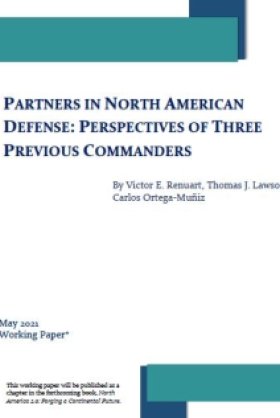Partners in North American Defense: Perspectives of Three Previous Commanders



Economics undoubtedly has been the principal driver and leading indicator of North American integration. With ratification of the North American Free Trade Agreement (NAFTA) in 1993 and its successful renegotiation and updating as the U.S.-Mexico-Canada Agreement (USMCA) in 2020, the continuation of dense trade and investment flows among the three countries seems assured. In recent decades, law enforcement agencies have embarked on ever closer coordination in response to the rise of criminal cartels and the threat of global terrorism. And although cooperation among the three countries’ military establishments has progressed (especially between the United States and Canada) and important developments can be noted, much still remains to be done if they are to reach their full potential militarily to secure an integrated continental defense for North America. This policy brief examines the background and prospects for that development in the sphere of military security.
This policy brief is part of our series "North America 2.0: Forging a Continental Future". The policy briefs will be released individually and published as a volume in 2021.
Authors



Mexico Institute
The Mexico Institute seeks to improve understanding, communication, and cooperation between Mexico and the United States by promoting original research, encouraging public discussion, and proposing policy options for enhancing the bilateral relationship. A binational Advisory Board, chaired by Luis Téllez and Earl Anthony Wayne, oversees the work of the Mexico Institute. Read more


Canada Institute
The mission of the Wilson Center's Canada Institute is to raise the level of knowledge of Canada in the United States, particularly within the Washington, DC policy community. Research projects, initiatives, podcasts, and publications cover contemporary Canada, US-Canadian relations, North American political economy, and Canada's global role as it intersects with US national interests. Read more

Explore More
Browse Insights & Analysis
The OSCE is a Good Value for America


